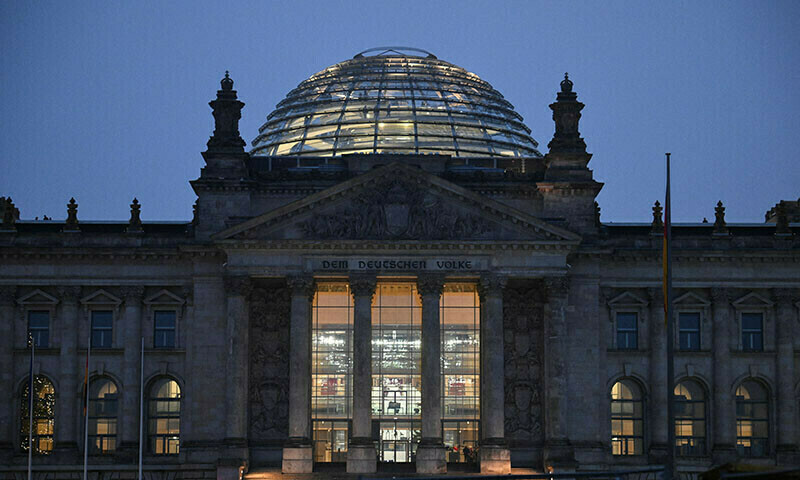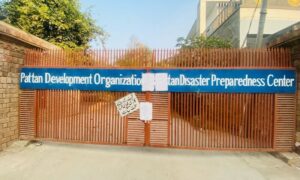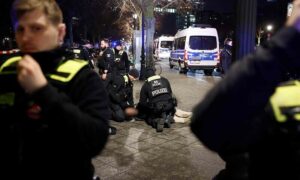With Germany’s 2025 election on the horizon, Pakistan’s geopolitical standing and diplomatic ties with Europe may hinge on the decisions made in Berlin.
Since September 2024, Germany’s then federal finance minister Christian Lindner had been warning of an ‘autumn of decisions’ or herbst der entscheidungen in a reference to what he believed were some difficult decisions the three-party coalition government would have to take in the interest of security, stability, and prosperity. On November 6, Chancellor Olaf Scholz took the first of these difficult decisions. He fired Lindner as finance minister, replacing him with close ally and fellow party member Joerg Kukies. “He has broken my trust too many times,” said the Chancellor of the former.
What followed was no surprise for Olaf Scholz. Lindner’s party, the Free Democratic Party (FDP), withdrew all of its ministers, leading to the collapse of a unique three-way coalition with the dubious distinction of being the most unpopular government in decades. Historically, chancellors in better positions have called a vote of confidence in such circumstances to pre-empt implosion with the prospects of a fresh election.
There was, therefore, little to speculate about Scholz’s next move. A vote of confidence was called, which the Chancellor duly lost, paving the way for a snap election in February 2025 instead of, as scheduled, in September. A winter election after over 30 years — the last one being in December 1990, hot on the heels of Germany’s reunification in October.
Germans going to the polls face the qual der wahl (agony of choice). But what does the German electoral system look like? Who are the main players, and why should anyone sitting in Pakistan care? Here is your complete guide.
How does voting work in Germany?
Germany has a federal system of government where the legislature like most democracies has two houses — the Bundestag consists of directly elected members, while the Bundesrat comprises delegations appointed by the country’s 16 federal states. On February 25, Germans will elect their 21st Bundestag. Only parties securing at least 5 per cent of the popular vote will gain seats.
The system of voting in Germany is sometimes called personalised proportional representation. Under this system, each voter gets to cast two votes — one (Erststimme or first vote) for a direct candidate from their constituency, and one (Zweitstimme or second vote) for a party. Each party is allocated a percentage of seats in the Bundestag based on the number of second votes it has received nationwide. The party then draws on a list of candidates for each federal state to fill the percentage of seats allocated. This is based on the descending order of first votes received and includes, if need be, candidates who did not win from their respective constituencies.
Until the 2021 federal elections, if more individual candidates were returned than the party’s percentage of seats, the Bundestag simply expanded to accommodate them — increasing the number of seats allocated to other parties until the proportional balance was restored. But reforms introduced in 2023 have fixed the number of seats in the lower house to 630. This means that if a party does not have enough seats to accommodate all of its returned candidates, those with the lowest votes — despite winning their constituencies — will be dropped because they lack the zweit stimmen deckung or second vote cover. Independent candidates are naturally exempt.
According to Article 38 of the grundgesetz or basic law, elections to the Bundestag are general, direct, free, equal and secret. Despite the provision, Germans abroad only gradually secured full voting rights. They can vote through the postal ballot from within or outside Germany without stating any special reason. Voters need to ensure, however, that they are listed in the respective local voters’ register weeks ahead of the election and then send in their vote no later than 6pm on wahlsonntag (election Sunday). While the legal voting age for the federal elections is 18, some state and European Parliament elections allow 16-year-olds to cast their votes.
Who are the contenders?
Germany has a multi-party system where political parties are known by their colours and their position on the political spectrum from far right to far left. Traditionally, right-wing politics has advocated for a free market, smaller government, and a nationalist approach in international relations. In recent years, it has come to include climate-sceptic and anti-immigration sentiment.
Left-wing politics, on the other end, has advocated for regulated markets, a bigger role for the government, internationalism, environmentalism and pro-immigration sentiment. Most political parties are keen to position themselves in the centre so as to be able to appeal to both electorates, but some parties like the Alternative for Germany (AfD) and the Left Party in Germany retain their loyal base on their respective ends of the spectrum.
A party’s position on the political spectrum roughly corresponds to the position its faction occupies in the Bundestag. Facing the house chair, known as the Bundestagspraesident (President of the Bundestag), to the far right sits the AfD. Next to it, sits the mostly described as centre-right, but keen on its part to avoid any labels, Christian Democratic Union (CDU) and its sister party from the state of Bavaria, the Christian Social Union (CSU) — collectively known as the Union. Further centre is the neoliberal and pro-business, Free Democratic Party (FDP). To the left of the FDP are the party benches of the Greens, followed by the centre-left Social Democratic Party (SPD). To the far left is the Left party, followed by Alliance Sarah Wagenknecht (BSW) — an eponymous alliance combining elements of left politics with hard-right policies.
What do they stand for?
The context here is critical. The Bundestagswahl 2025 comes at a time when Germany is faced with a choice between redefining its identity and reasserting it. It is in this context that the parties have to plan their campaigns and the people have to cast their vote.
The country’s economic growth projection for 2025 stands at 0.3pc — last place in the list of industrial states, with China leading at 4.6pc. This has followed two consecutive years of a shrinking economy, inflation, rising energy prices, and labour disputes. Support for Ukraine is considered indispensable to Europe’s security and Germany’s relevance in the international order, while support for Israel is seen as a responsibility. However, both have come at a cost, and a significant segment of the electorate is increasingly unwilling to bear it. Policies informed by climate awareness and social inclusivity — irrespective of race and gender — are also increasingly met with suspicion because of the toll it is often seen to take on affordable living and cultural homogeneity.
At this point, German voters must decide: Do they want to change course and redefine their identity? Or do they wish to reaffirm the values they have upheld with unwavering conviction? Something has to give, and all campaigning parties have tailored their strategies and rhetoric accordingly.
What’s the outlook for Germany’s foreign policy?
When it comes to foreign policy and the role of Germany in international conflicts, it is the centre parties who come out as more hawkish, supporting a status quo of confrontation and bloc politics. Under any of these parties — or a coalition, as is more likely — Germany is set to pursue a foreign policy informed by the traditional security paradigm: Russia is the enemy posing an existential threat, China is the competitor that needs to be viewed with scepticism but also engaged, the US an ally — until it is not — and Europe needs to come together closer and stronger.
All four parties commit to the North Atlantic Treaty Organisation’s (Nato) defence spending target of 2pc of the GDP — a figure Germany has struggled to reach but is likely to rise as far as 5pc in the coming years, with the Trump administration making it increasingly clear it no longer wants to shoulder the burden of Europe’s defence.
A cornerstone of foreign policy for these parties is support for Ukraine and Israel, including military assistance. The Taurus missiles would have been a likely point of contention in this regard in a future coalition since the SPD is the only centre party against the deployment of the Luftwaffe’s most advanced missile system in Ukraine. But this is now unlikely with a US-led ceasefire on the horizon. A ceasefire that, to the horror of Germany and its major parties, is likely to be decided over the heads of the US’ European partners as well as Ukraine.
Interestingly, parties on the far ends of the spectrum believe and demand otherwise. With the exception of the Left, both the AfD and BSW view the European Union with scepticism and emphasise national sovereignty. But while the BSW calls for reforms within the existing structures, the AfD goes so far as to call for a referendum on leaving the EU, replacing it with a federation of sovereign nations. It is worth mentioning here that the AfD is not anti-Europe; it is against the centralist tendencies and eastward expansion of the EU. In the long term, the party even envisions a capable and independent European military alliance and is on the same page with the Union in calling for compulsory military service and a higher defence budget.
All far-end parties reject confrontation with Russia, call for the lifting of sanctions, and oppose arms deliveries to Ukraine. The AfD and BSW also call for reinstating Nord Stream 2 — a 1,234-km-long natural gas pipeline from Russia to Germany running through the Baltic Sea. In the case of China, they emphasise a pragmatic approach to deepening ties, while the US is seen as pursuing geopolitical and economic interests that, far from aligning with those of Germany and Europe, create more problems from an economic and security point of view.
The AfD does not mention Israel in its manifesto but has previously held the government responsible for ‘all civilian deaths’ in the region based on Germany’s continued arms supplies to Israel. The Left and BSW — while condemning Hamas for the October 7, 2023, attacks — take a firm stance against Israel’s aggression in Gaza, with the former calling for the recognition and implementation of the ICC’s arrest warrants against Benjamin Netanyahu and his former defence minister. The BSW condemns the intertwining of antisemitism with criticism of the state of Israel. The party’s manifesto states that the crimes against the civilian population in Gaza, the West Bank, and Lebanon rightly outrage the world.
Watching from a distance: (where) does Pakistan figure in all of this?
In February 2012, over two months after Nato’s aerial attack on the Salala check post in Pakistan, the Bundestag briefly debated Germany’s Pakistan policy based on a motion put forward by the Greens. The motion reflects an acute understanding of Pakistan’s strategic mindset but draws a sobering conclusion: despite its trade and development cooperation with Pakistan, Germany enjoys little influence over Pakistan’s foreign policy. The motion lamented that Pakistan’s potential as a geopolitical partner in the region had been underestimated for too long.
Fast forward to 2025 — an Enquete Commission, constituted by the Bundestag to draw lessons from Germany’s engagement in Afghanistan for future foreign, development, and security policy, publishes a 100-page report. In this report, Pakistan receives a humbling mention — just one bullet point. “Interests and influence of regional states, especially Pakistan,” an observation in the report reads. Retrospectively, one can only assume that the 2012 motion did not find many takers in Berlin.
As of 2021, Germany is Pakistan’s fourth-largest bilateral donor and its most important trading partner in the European Union (EU). However, in foreign policy, Pakistan is often eclipsed by greater concerns either eastward in the Indo-Pacific or westward in the Near East, as it is referred to in Germany. In fact, among parliamentary groups for countries and regions in the Bundestag, Pakistan is clustered with Afghanistan, Bangladesh, Bhutan, the Maldives, Nepal, and Sri Lanka in the German-South Asian parliamentary group.
Derya Tuerk-Nachbauer of the SPD, a member of this group, is advocating for a German-Pakistan group, to engage with Pakistan at augenhoehe (eye level), allowing both parties to be frank about their interests and ensuring Pakistan is recognised as a regional player in its own right. Regardless of whether Tuerk-Nachbauer’s proposals gain approval, Pakistan will continue to feel the effects of changing governments and policies in Berlin — particularly in the aftermath of the February elections.
As discussed earlier, the foreign policies of all centre parties are largely aligned, as are those of the far-end parties, whether left or right. Under a black-yellow alliance — a possibility if the FDP surpasses the 5pc threshold — China is viewed as a strategic competitor from which Germany must increasingly seek independence. As a result, Pakistan can expect greater counter-balancing cooperation with and assistance to India, along with diminished enthusiasm for Sino-Pak projects seen as expanding or entrenching Chinese influence. This stance is unlikely to change under any other centre coalition.
However, if the Bundestag’s push to prioritise Pakistan in regional policy succeeds, an alternative approach may emerge — leveraging Germany and the EU’s trade and development influence in Pakistan to counterbalance China’s growing presence. This could, in turn, help Pakistan maintain a more open and flexible stance in great power politics.
In the ongoing migrant crisis — which, for political and ideological reasons, remains the most critical campaign issue in Germany — Pakistan finds another opening. Proposals by the AfD to re-establish diplomatic relations with Afghanistan, aimed at easing the burden on the German embassy in Islamabad, controlling migrant flows, and facilitating the deportation of Afghan refugees from Germany, were under discussion in the Bundestag last year. Depending on the percentage of votes the AfD secures in the election, it may push this motion through — potentially with the support of the Union, FDP, and BSW, all of whom have recently endorsed stricter migration laws.
If German diplomatic offices reopen in Afghanistan, the country could also act as a broker in Pak-Afghan relations, as cooperation between the two nations would be crucial in managing a potential returnee influx and combating extremist and terrorist groups increasingly seen as a threat beyond the region. Alleviating the burden on the German embassy in Islamabad would also improve consular services for applicants in Pakistan.
It is worth mentioning here that all parties for tougher controls on immigration still encourage importing skilled labour, especially in fields with a personnel shortage such as IT and healthcare. With an average age of 45, an ageing population in Germany naturally creates a vacuum that Pakistan, with an average age of 20, is in a unique position to help fill. Not only would this sit well with right and centre-right parties (provided the immigrants demonstrate a ‘willingness to integrate’) but also with the left and centre-left who tend to adopt a feminist and decolonial approach to international development cooperation.
This brings us to the question of development aid. What is the outlook under a new government? Whether left or right, social or conservative, development aid in the coming years is bound to come under greater scrutiny for a simple reason — there has been a shift away from endowing generous amounts of taxpayer money to — not only, but especially — governments marked by corruption and inefficiency. Pakistan does not perform particularly well on either scale.
In addition to this, both Berlin and Brussels appear to have a comprehensive understanding of the human rights situation and the military’s leverage in government and policy. Under a centre-left government, Pakistan might hear more of what Olof Skoog said regarding the Generalised System of Preferences Plus (GSP+) status during his recent visit.
The CDU and SPD tend to view development aid as a foreign policy tool, though the latter also sees it as a means to address what it calls ‘colonial continuities’ — a reference to Germany’s responsibility in addressing the structural imbalances left by colonialism. The Greens adopt a similar approach, pairing it with a focus on climate and biodiversity financing as well as strengthening local healthcare systems.
However, the FDP, BSW, and AfD take a different stance. The FDP has called for cutting the development budget and aligning all aid with Germany’s economic and security interests. The BSW also sees aid as a tool for addressing the root causes of migration. The AfD, on the other hand, insists that aid should be limited to self-help initiatives and rejects support for ‘corrupt systems.’ The AfD manifesto explicitly mentions Pakistan, stating that development aid to China and India — or to nuclear powers such as Pakistan — should be cancelled.
Fly on the wall: Perspective of a Pakistani
When the general elections were held in Pakistan in February 2024, I was glued to livestreams all day from my home in Stuttgart. The power wielded by the electorate has fascinated me ever since I turned 18, but I knew I was not going to get a vote this time; the question was too political and too polarising to be resolved. So, I removed the app timers from my phone, meant to keep my social media activity in check, and went about my day constantly looking down at my phone, switching between multiple tabs. Agitated voices in my head were constantly in dialogue, trying to make sense of what was going on back home.
Having been in Germany for only three years, I am naturally not as emotionally invested in the Bundestagswahl as I was in the election in Pakistan. But as elections loom, one does get invested in other ways —politically, socially, culturally — and one learns. For instance, I was going through a children’s magazine when I came across a special feature by the Child Representative for Stuttgart titled ‘What Do Children and Young People Choose?’ I started reading it, thinking it was about children’s likes and dislikes — titled only in the spirit of the approaching Bundestag election. I soon realised I was wrong.
This was a feature meant to bring the parent or reader’s attention to the nationwide children and youth election being conducted from February 7 to 14 to give everyone under 18 the opportunity to cast a mock vote for the Bundestagswahl. The results of this election were made public on February 17, six days before the official election. The idea was to give children and youth the opportunity to make their voices heard, and all registered voters above 18 the opportunity to take those voices into account.
One can think about this on two levels. Do you explain to children that the funniest candidate for chancellor isn’t necessarily the best option because he could bring compulsory military service for them and war for Germany? It might be easy to explain the importance of a speed limit on the Autobahn road — the famed highway system with no speed limit — but why can’t we let everyone crossing the sea in an inflatable vessel into our country? Children are too young to grapple with these questions at this stage.
But there’s another level to consider — one that circumvents the complexities of adult decision-making and simply lets kids engage with the process. They register themselves, walk into a polling station, stand behind a voting booth, and put a cross against the name of their favourite political party. Then they watch the results unfold, celebrate (or perhaps don’t), but one thing is certain: they will never again be indifferent to elections. For the quality of democracy, for voter education, for informed decisions, for accountability, and for resistance — this can do wonders.
But I don’t have the vote and neither am I under 18. So, I do the third best thing that I can do. I wait for the Wahl-O-Mat to go live. The Wahl-O-Mat is a question-answer tool designed by the Federal Agency for Civic Education to inform voters and assist them in making informed choices. The tool takes your opinion on 38 statements — you can respond with agree, disagree, neutral or skip — and then calculates which party or independent candidate’s position is most aligned with your ideas. You can assign equal weightage to all statements, or if you feel strongly about certain subjects, assign twice the weightage to these subjects. You can also choose which parties you want to calculate your results against. The Wahl-O-Mat also includes analysis to help you understand what positions parties and candidates have taken on each statement.
I answer the questions and let the Wahl-O-Mat compile my result. Then I go back and adjust some settings, and go back and adjust some more until I get the result I want. Don’t we all just know who we’re voting for?
What would a tool like that look like in Pakistan? Are we informed enough to have opinions on such a wide range of policy matters? My guess is no, but, neither is every German. And that is why the Wahl-O-Mat exists. It arose from the need to educate the electorate and has the fulfilment of that need built into its design. This means you may not know much about policies and party positions to begin with, but you will find out with the results and accompanying analyses. Having a similar tool in Pakistan would at best inform us about key themes, and at worst sensitise us, so that — like those German kids acquainted with the electoral process — we are never again indifferent to them.
There is a lot a Pakistani in Germany can learn and take back home in the way of lessons from elections in Germany. The country also boasts a high voter turnout — calculated at 76.6pc in 2021, it has gone as far up as 91.1pc in the past — and a large percentage of this (47.3pc in 2021) votes using the briefwahl or postal vote. This option is available to all citizens living inside or outside Germany, as long as they are registered in the local voters register. Then there are the televised debates and interviews where party leaders and chancellor candidates defend their policy and vision, often in front of a live audience.
When the Wahl-O-Mat went live on February 6, this party released a ‘key’ of responses to the 38 questions on their social media with the caption, “We know thinking is hard work, so we have prepared a complete solution for you”. Since I am all in for the experience, I put these responses into the tool. Not surprisingly, it yields a 100pc match with Die Partei. On the question of continued military support to Ukraine, the party’s response is ‘neutral’. When I scrolled down to the justification in the analysis, the party had defended its position with one line: Kein weltkrieg ohne Deutschland! And that, dear reader, I will leave for you to look up yourself.
Best wishes to the German people for February 23!
Header image: The Reichstag building, the seat of the German parliament, after President Frank-Walter Steinmeier dissolved the lower house and Chancellor Olaf Scholz lost a confidence vote, in Berlin on December 27, 2024. — Reuters
- Desk Reporthttps://foresightmags.com/author/admin/











